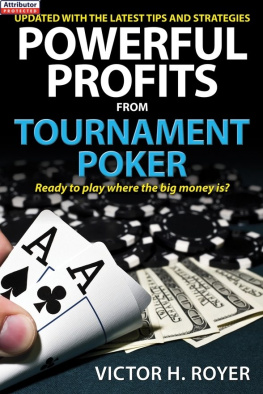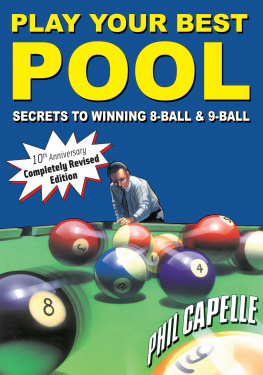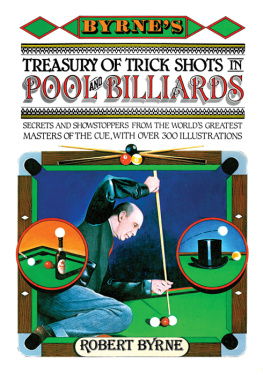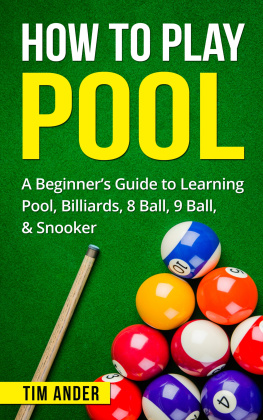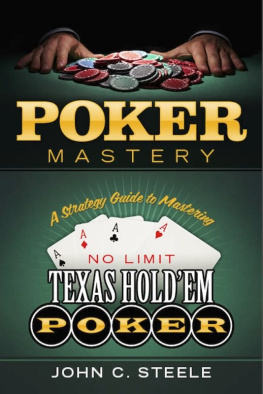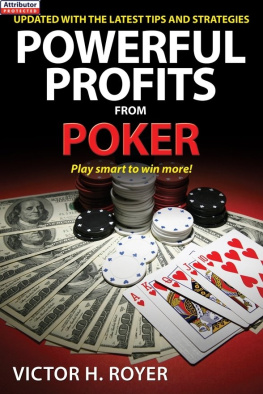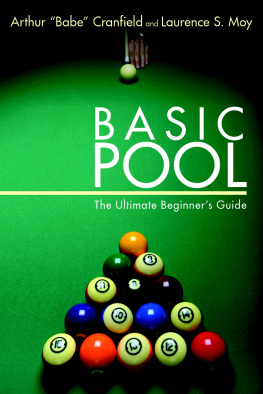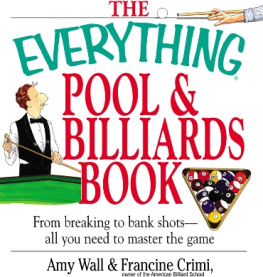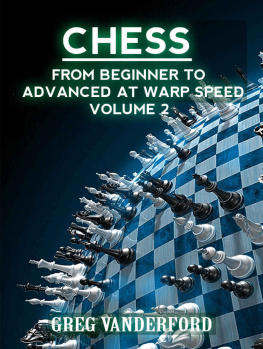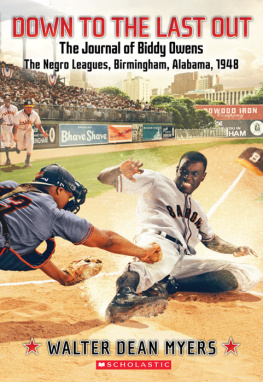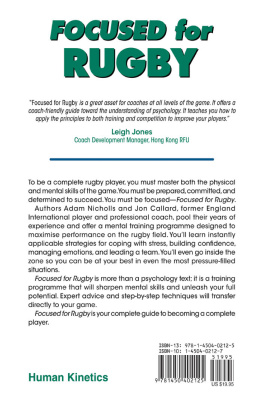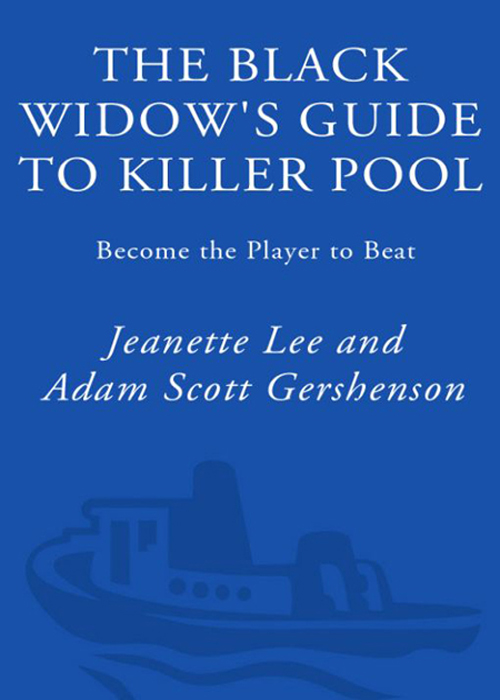
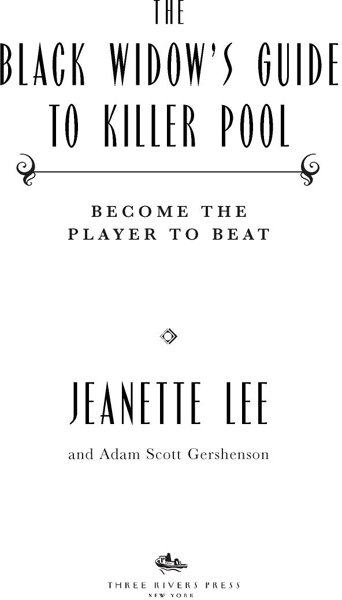
Table of Contents
To my dear friend and mentor Gene
and my greatest love, George.
I dedicate this book and my life to both of you.
JEANETTE LEE

To the women I love
nurturing and wise, beautiful and kind.
ADAM GERSHENSON
ACKNOWLEDGMENTS
Thanks to George Breedlove for his love, insights, and patience with me during the writing of this book.
To Pete Fornatale and Basil Kane. Their faith in this project let me know that everything was going to be all right.
To Imperial International and Jay Orner & Sons Billiard Company, Inc., for their support and for letting me have all the best equipment at my fingertips.
To Lisa Merkin, whose original Jot-a-Shot program produced beautiful diagrams.
To Bob Carman, who helped me look inside myself and share it with all of you.
To all the photographers who helped capture my spirit.
To Amsterdam Billiards, where this book was born.
To Wayne, Debbie, and Clark Johnson for close critiques and zucchini bread.
To the Womens Professional Billiard Association and BilliardsDigest and Pool & Billiard magazine.
To Adam Gershenson, for all the early mornings and late nights he spent getting to know me. And thanks to his mom, Judith, as well.
To everyone at Octagon Athlete Representation, especially Tom, Dre, Deb, Cynthia, and Amy, for taking care of everything.
To Larry York, Steve Durell, and Stu Slowroll Matana for helping me keep my game in top form.
And to all my fans, friends, family, and neighbors, thank you for your friendship and support.

Many thanks to Basil Kane, whose sage guidance helped us arrive at Crown.
To Jack Kadden and Jim Roberts, first-class newspapermen from the New York Times.
To Pete Fornatale, who combined a sharp critical eye with remarkable restraint. He asked only for changes that truly made the book better.
To Boston Billiards, the best host anyone could ask for.
To my mother, Judith Rendely, who interviewed Jeanette one morning while I slept and later held the manuscript in her hands while I revised it with a red pencil and a broken wrist.
A. G.

It is not the critic who counts, not the man who points out how the strong man stumbles, or where the doer of deeds could have done better. The credit belongs to the man who is actually in the arena, whose face is marred by dust and sweat and blood; who strives valiantly; who errs and comes up short again and again, because there is no effort without error and shortcoming; but who does actually strive to do the deeds; who knows the great enthusiasms, the great devotions; who spends himself in a worthy cause; who at the best knows in the end the triumph of high achievement, and who at the worst, if he fails, at least fails while daring greatly, so that his place shall never be with those cold and timid souls who know neither victory nor defeat.
THEODORE ROOSEVELT
INTRODUCTION

I was twenty-two the first time I entered the zone. It was like nothing I had ever experienced. Ball after ball went tumbling into the pocket, almost before I knew I had taken a shot.
Stripes and solids, bank shots, cut shots, and combinations. One after another. I lost count pretty quickly, but my mentor, Gene Nagy, kept a tally as he set up each new rack.
We were out in Queens, at a caf known as La Cue, where I played every day with Gene. He had the perfect personality for a mentor, and with his long, flowing white beard, he even looked like a guru.
A crowd gathered around us, but I didnt notice. All I saw was the table, as it gradually revealed its mysteries. Somehow, for the first time in my life, I truly could not miss.
When at last it ended, on an impossible lie, I was ecstatic. One hundred and twenty-two balls! I had never heard of a woman topping one hundred, and I thought for sure I had scaled the mountaintop.
Then Gene chalked up. In the very next inning, he started a streak that ran for 230 consecutive shots. He didnt say a word, but I learned plenty just the same.
I learned there is always room for improvement in this game. Im still learning that, at every tournament and during every practice session. To me, thats what makes pool so incredibleyou cant master it, but you can always get better.
See, I wasnt always the Black Widow. I got that nickname from some guys in a local poolroom, because I always wore black and I looked deadly at the table. But when I walked into a poolroom for the first time ten years ago, I was just Jeanette, an eighteen-year-old dropout, a rebel, a waitress trying to make the rent on my studio in Manhattan.
No one could have predicted that I would succeed at pool. I was the wrong sex. I was too oldmost of pools champions started shooting as children. Plus, I had a distinct physical handicap for a sport that requires constant bending: scoliosis. My spine was curved, and I would have been a hunchback were it not for eighteen inches of metal rod implanted in my back.
But five years later, I was ranked as the number one pool player on the face of the earth. Since then, I have helped lead the womens game out of obscurity and into the limelight, made the quickest run from nowhere to number one in the history of the game, and earned more money than any other professional playing today.
I was a scrawny, handicapped girl. Now Im a champion. I have done motivational speaking for Fortune 500 companies and top-notch universities. In every city on the tour, I see young girls who tell me they want to grow up and be like me. Ive got an image as both a dedicated athlete and a sophisticated woman who takes what she wants.
That eighteen-year-old waitress has become a twenty-eight-year-old married woman, a spokeswoman for national charities, and an athlete making mortgage payments on a giant ranch house in the Midwest.
The transformation wasnt easy. I could have quit a thousand times, after bitter losses, close calls, and hospital visits, but I never did, because in my heart I knew I could make it, even though everyone else thought it was unrealistic.
I had to learn all the techniques I will share with you in this bookfrom how to make a bridge to how to sink a bank shot with a TV camera in your face.
But the lessons I have learned can make you more than just the player to beat in your basement, bar league, or tournament.
I have learned how to compete, how to lose gracefully and win frequently. I have come to understand the psychology of success, the importance of mental toughness. I have learned the difference between competing against men and against women. I know how to stay focused under pressure, and how to achieve goals in the face of seemingly impossible odds. I am learning how to handle success, and how to balance a career and a family.
And now I want to share my secrets.
These secrets can help you succeed, whether or not you ever pick up a cue stick. They were learned in the poolroom, but the mental, analytical, and psychological techniques also work at home and in the office.
Next page

